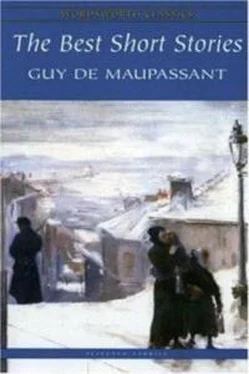There were present at the trial both the man and the woman, a middle–class pair from the provinces, living on their income. They were so exasperated against this girl, who had sullied their house, that they would have liked to see her guillotined on the spot without a trial. The spiteful depositions they made against her became accusations in their mouths.
The defendant, a large, handsome girl of Lower Normandy, well educated for her station in life, wept continuously and would not answer to anything.
The court and the spectators were forced to the opinion that she had committed this barbarous act in a moment of despair and madness, since there was every indication that she had expected to keep and bring up her child.
The president tried for the last time to make her speak, to get some confession, and, having urged her with much gentleness, he finally made her understand that all these men gathered here to pass judgment upon her were not anxious for her death and might even have pity on her.
Then she made up her mind to speak.
"Come, now, tell us, first, who is the father of this child?" he asked.
Until then she had obstinately refused to give his name.
But she replied suddenly, looking at her masters who had so cruelly calumniated her:
"It is Monsieur Joseph, Monsieur Varambot's nephew."
The couple started in their seats and cried with one voice—"That's not true! She lies! This is infamous!"
The president had them silenced and continued, "Go on, please, and tell us how it all happened."
Then she suddenly began to talk freely, relieving her pent–up heart, that poor, solitary, crushed heart—laying bare her sorrow, her whole sorrow, before those severe men whom she had until now taken for enemies and inflexible judges.
"Yes, it was Monsieur Joseph Varambot, when he came on leave last year."
"What does Mr. Joseph Varambot do?"
"He is a non–commissioned officer in the artillery, monsieur. Well, he stayed two months at the house, two months of the summer. I thought nothing about it when he began to look at me, and then flatter me, and make love to me all day long. And I let myself be taken in, monsieur. He kept saying to me that I was a handsome girl, that I was good company, that I just suited him—and I, I liked him well enough. What could I do? One listens to these things when one is alone—all alone—as I was. I am alone in the world, monsieur. I have no one to talk to—no one to tell my troubles to. I have no father, no mother, no brother, no sister, nobody. And when he began to talk to me it was as if I had a brother who had come back. And then he asked me to go with him to the river one evening, so that we might talk without disturbing any one. I went—I don't know—I don't know how it happened. He had his arm around me. Really I didn't want to—no—no—I could not—I felt like crying, the air was so soft —the moon was shining. No, I swear to you—I could not—he did what he wanted. That went on three weeks, as long as he stayed. I could have followed him to the ends of the world. He went away. I did not know that I was enceinte. I did not know it until the month after—"
She began to cry so bitterly that they had to give her time to collect herself.
Then the president resumed with the tone of a priest at the confessional: "Come, now, go on."
She began to talk again: "When I realized my condition I went to see Madame Boudin, who is there to tell you, and I asked her how it would be, in case it should come if she were not there. Then I made the outfit, sewing night after night, every evening until one o'clock in the morning; and then I looked for another place, for I knew very well that I should be sent away, but I wanted to stay in the house until the very last, so as to save my pennies, for I have not got very much and I should need my money for the little one."
"Then you did not intend to kill him?"
"Oh, certainly not, monsieur!"
"Why did you kill him, then?"
"It happened this way. It came sooner than I expected. It came upon me in the kitchen, while I was doing the dishes. Monsieur and Madame Varambot were already asleep, so I went up, not without difficulty, dragging myself up by the banister, and I lay down on the bare floor. It lasted perhaps one hour, or two, or three; I don't know, I had such pain; and then I pushed him out with all my strength. I felt that he came out and I picked him up.
"Ah! but I was glad, I assure you! I did all that Madame Boudin told me to do. And then I laid him on my bed. And then such a pain griped me again that I thought I should die. If you knew what it meant, you there, you would not do so much of this. I fell on my knees, and then toppled over backward on the floor; and it griped me again, perhaps one hour, perhaps two. I lay there all alone—and then another one comes—another little one—two, yes, two, like this. I took him up as I did the first one, and then I put him on the bed, the two side by side. Is it possible, tell me, two children, and I who get only twenty francs a month? Say, is it possible? One, yes, that can be managed by going without things, but not two. That turned my head. What do I know about it? Had I any choice, tell me?
"What could I do? I felt as if my last hour had come. I put the pillow over them, without knowing why. I could not keep them both; and then I threw myself down, and I lay there, rolling over and over and crying until I saw the daylight come into the window. Both of them were quite dead under the pillow. Then I took them under my arms and went down the stairs out in the vegetable garden. I took the gardener's spade and I buried them under the earth, digging as deep a hole as I could, one here and the other one there, not together, so that they might not talk of their mother if these little dead bodies can talk. What do I know about it?
"And then, back in my bed, I felt so sick that I could not get up. They sent for the doctor and he understood it all. I'm telling you the truth, Your Honor. Do what you like with me; I'm ready."
Half of the jury were blowing their noses violently to keep from crying. The women in the courtroom were sobbing.
The president asked her:
"Where did you bury the other one?"
"The one that you have?" she asked.
"Why, this one—this one was in the artichokes."
"Oh, then the other one is among the strawberries, by the well."
And she began to sob so piteously that no one could hear her unmoved.
The girl Rosalie Prudent was acquitted.
Regret
Monsieur Saval, who was called in Mantes "Father Saval," had just risen from bed. He was weeping. It was a dull autumn day; the leaves were falling. They fell slowly in the rain, like a heavier and slower rain. M. Saval was not in good spirits. He walked from the fireplace to the window, and from the window to the fireplace. Life has its sombre days. It would no longer have any but sombre days for him, for he had reached the age of sixty–two. He is alone, an old bachelor, with nobody about him. How sad it is to die alone, all alone, without any one who is devoted to you!
He pondered over his life, so barren, so empty. He recalled former days, the days of his childhood, the home, the house of his parents; his college days, his follies; the time he studied law in Paris, his father's illness, his death. He then returned to live with his mother. They lived together very quietly, and desired nothing more. At last the mother died. How sad life is! He lived alone since then, and now, in his turn, he, too, will soon be dead. He will disappear, and that will be the end. There will be no more of Paul Saval upon the earth. What a frightful thing! Other people will love, will laugh. Yes, people will go on amusing themselves, and he will no longer exist! Is it not strange that people can laugh, amuse themselves, be joyful under that eternal certainty of death? If this death were only probable, one could then have hope; but no, it is inevitable, as inevitable as that night follows the day.
Читать дальше












